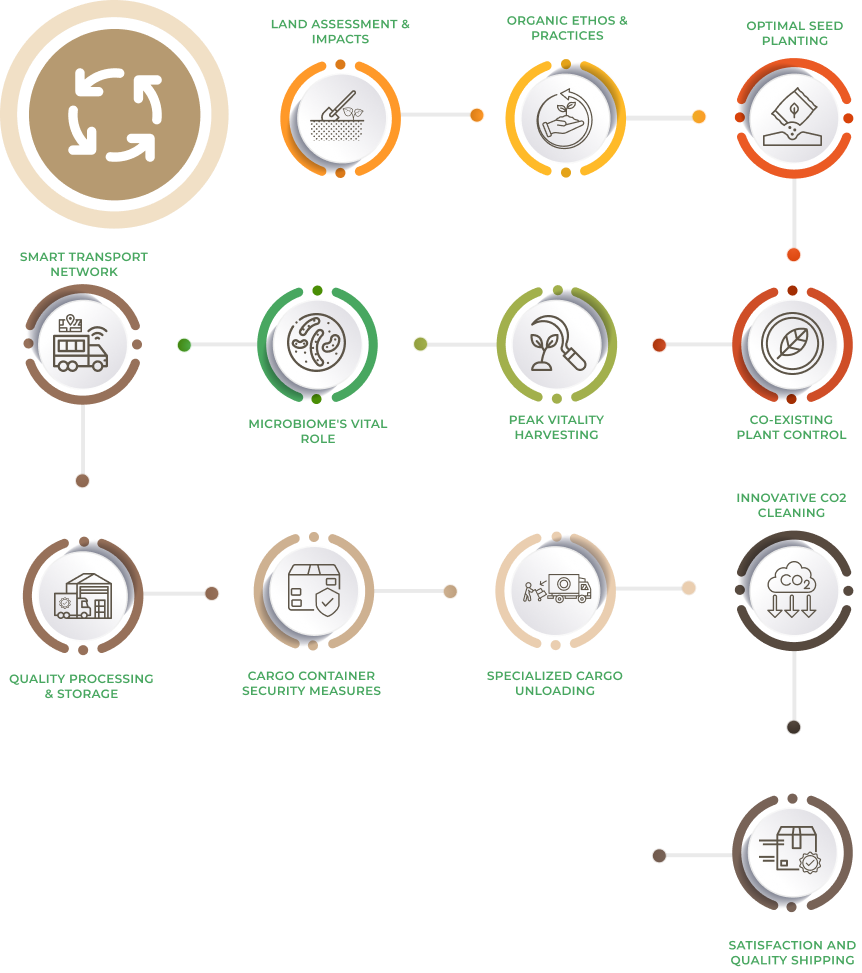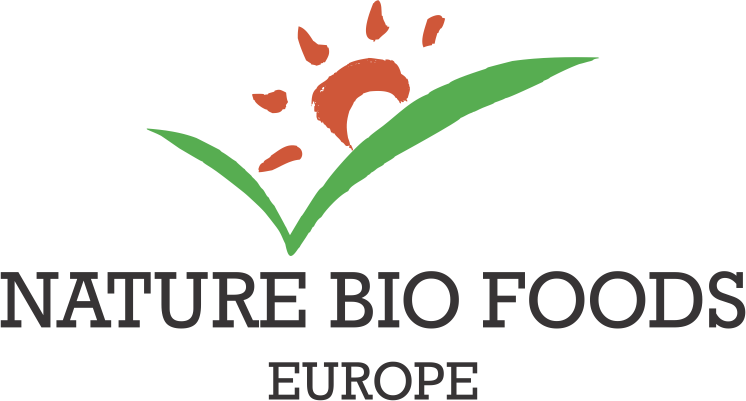
Detailed scientific study is carried out before establishing any project to check suitability of the land, crop specific climatic requirement and its socio economic & environmental impacts.
Ethos of Organic agriculture is to work with the nature and having a minimalistic approach in using natural resources which is judicial. Different crops that we grow require varied agro practices. Our operations are always focused to minimizing tillage operations, keeping the co-plants (conventionally called weeds) at control and developing a natural ecosystem to flourish for not allowing any insect/ pathogen to grow beyond an economic threshold level to be called as ‘pest’.
Planting materials, more often called as ‘seeds’, represent enormous potential. Every seed carries an imprint of cosmic arrangements and thus it is critical that seeds are sown at a time, depth and season which is the best suit for balancing vitality and yield.
It is important that the growth of co-existing plants are kept in economic control for commercial cultivation of main crops. We reckon that every plant that grows naturally on a cropping field has a defined role to play in directly or indirectly contributing to balanced growth of the main crop or by suppressing other co-crops by means of allelopathy.
Harvesting is the operation of gathering the useful part or parts of the plant and is carried out at the time when all the nutrients have developed to offer maximum vitality. We align ourselves to the lunar cycle in determining the best time to initiate harvesting.
At Nature Bio Foods, we essentially consider the microbiome as the true torch bearers of universal life. Without the myriad and most critical roles they play in harnessing nutrients, fetching moisture, contributing essential enzymes and antibiotics to the plants life in the planet are most improbable. We work with nature to create that ambience in which crops planted are self-sustaining and robust. Home grown microbial cultures, compost and compost tea facilitates the purpose aptly.
Smart Transport network enables agriculture and emboldens the farmer to invest more and increase production. All but an efficient transport system would often fail essence of commercial agriculture in spite of laid out good farming practices. Post-harvest quick transportation that suits the best to the environmental causes has been kept in focus at our supply chain.
Quickly transported Organic ingredients, once reach the processing units, are cleaned at our state-of –the-art units and stored in modern hygienic facilities for onward packaging and distribution.
To ensure the stability of cargo containers during transportation across various modes, several pre-defined measures are implemented. In waterway shipping, solid foam or folded fibre board is strategically placed in the curved or triangular areas of the container’s floor. This placement effectively prevents the shifting of the load, providing better support and keeping the cartons upright.
During the unloading process, specialized tools and equipment are used to prevent any loss or damage to the organic ingredients. These measures ensure that the organic food ingredients are handled with care and maintain their quality throughout the procedure.
At our Rotterdam warehouse, we have implemented an innovative in-house CO2 cleaning system that plays a crucial role in reducing our environmental impact. This advanced technology allows us to recover up to 98% of the carbon emitted during the organic ingredients processes. By capturing and recycling this CO2, we actively contribute to minimizing greenhouse gas emissions and promoting sustainable practices.
At the last stage, the pallets containing organic ingredients are delivered to the customers, prioritizing their utmost satisfaction. Compressive SOPs and tracking procedures are in place to prevent package loss and provide timely updates regarding the shipment status. This ensures a smooth and reliable delivery process.
NBF Supply Chain

Detailed scientific study is carried out before establishing any project to check suitability of the land, crop specific climatic requirement and its socio economic & environmental impacts.
Ethos of Organic agriculture is to work with the nature and having a minimalistic approach in using natural resources which is judicial. Different crops that we grow require varied agro practices. Our operations are always focused to minimizing tillage operations, keeping the co-plants (conventionally called weeds) at control and developing a natural ecosystem to flourish for not allowing any insect/ pathogen to grow beyond an economic threshold level to be called as ‘pest’.
Planting materials, more often called as ‘seeds’, represent enormous potential. Every seed carries an imprint of cosmic arrangements and thus it is critical that seeds are sown at a time, depth and season which is the best suit for balancing vitality and yield.
It is important that the growth of co-existing plants are kept in economic control for commercial cultivation of main crops. We reckon that every plant that grows naturally on a cropping field has a defined role to play in directly or indirectly contributing to balanced growth of the main crop or by suppressing other co-crops by means of allelopathy.
Harvesting is the operation of gathering the useful part or parts of the plant and is carried out at the time when all the nutrients have developed to offer maximum vitality. We align ourselves to the lunar cycle in determining the best time to initiate harvesting.
At Nature Bio Foods, we essentially consider the microbiome as the true torch bearers of universal life. Without the myriad and most critical roles they play in harnessing nutrients, fetching moisture, contributing essential enzymes and antibiotics to the plants life in the planet are most improbable. We work with nature to create that ambience in which crops planted are self-sustaining and robust. Home grown microbial cultures, compost and compost tea facilitates the purpose aptly.
Smart Transport network enables agriculture and emboldens the farmer to invest more and increase production. All but an efficient transport system would often fail essence of commercial agriculture in spite of laid out good farming practices. Post-harvest quick transportation that suits the best to the environmental causes has been kept in focus at our supply chain.
Quickly transported Organic ingredients, once reach the processing units, are cleaned at our state-of –the-art units and stored in modern hygienic facilities for onward packaging and distribution.
To ensure the stability of cargo containers during transportation across various modes, several pre-defined measures are implemented. In waterway shipping, solid foam or folded fibre board is strategically placed in the curved or triangular areas of the container’s floor. This placement effectively prevents the shifting of the load, providing better support and keeping the cartons upright.
During the unloading process, specialized tools and equipment are used to prevent any loss or damage to the organic ingredients. These measures ensure that the organic food ingredients are handled with care and maintain their quality throughout the procedure.
At our Rotterdam warehouse, we have implemented an innovative in-house CO2 cleaning system that plays a crucial role in reducing our environmental impact. This advanced technology allows us to recover up to 98% of the carbon emitted during the organic ingredients processes. By capturing and recycling this CO2, we actively contribute to minimizing greenhouse gas emissions and promoting sustainable practices.
At the last stage, the pallets containing organic ingredients are delivered to the customers, prioritizing their utmost satisfaction. Compressive SOPs and tracking procedures are in place to prevent package loss and provide timely updates regarding the shipment status. This ensures a smooth and reliable delivery process.


